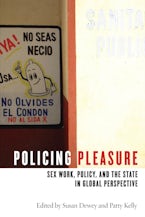Policing Pleasure
Sex Work, Policy, and the State in Global Perspective
Mónica waits in the Anti-Venereal Medical Service of the Zona Galactica, the legal, state-run brothel where she works in Tuxtla Gutiérrez, Mexico. Surrounded by other sex workers, she clutches the Sanitary Control Cards that deem her registered with the city, disease-free, and able to work. On the other side of the world, Min stands singing karaoke with one of her regular clients, warily eyeing the door lest a raid by the anti-trafficking Public Security Bureau disrupt their evening by placing one or both of them in jail.
Whether in Mexico or China, sex work-related public policy varies considerably from one community to the next. A range of policies dictate what is permissible, many of them intending to keep sex workers themselves healthy and free from harm. Yet often, policies with particular goals end up having completely different consequences.
Policing Pleasure examines cross-cultural public policies related to sex work, bringing together ethnographic studies from around the world—from South Africa to India—to offer a nuanced critique of national and municipal approaches to regulating sex work. Contributors offer new theoretical and methodological perspectives that move beyond already well-established debates between “abolitionists” and “sex workers’ rights advocates” to document both the intention of public policies on sex work and their actual impact upon those who sell sex, those who buy sex, and public health more generally.
Contributor Bios
Reviews
"A rich and deeply insightful collection of ethnographic studies of sex work, taking us from China to Braziland from South Africa to North America. Probing into the complex nexus of structure and agency, exploitation and liberation, it sensitively exposes the need for public policy that is evidence-based and responsive to the lives and experiences of sex-working adults and children. A tremendously valuable and welcome collection for teaching, research, and analysis of contemporary conditions in the global sex trade." ~ Kamala Kempadoo,author of Sexing the Caribbean: Gender, Race, and Sexual Labour
 This work is licensed under a
Creative Commons Attribution-NonCommercial-ShareAlike 4.0 International License
(CC BY-NC-SA).
This work is licensed under a
Creative Commons Attribution-NonCommercial-ShareAlike 4.0 International License
(CC BY-NC-SA).


